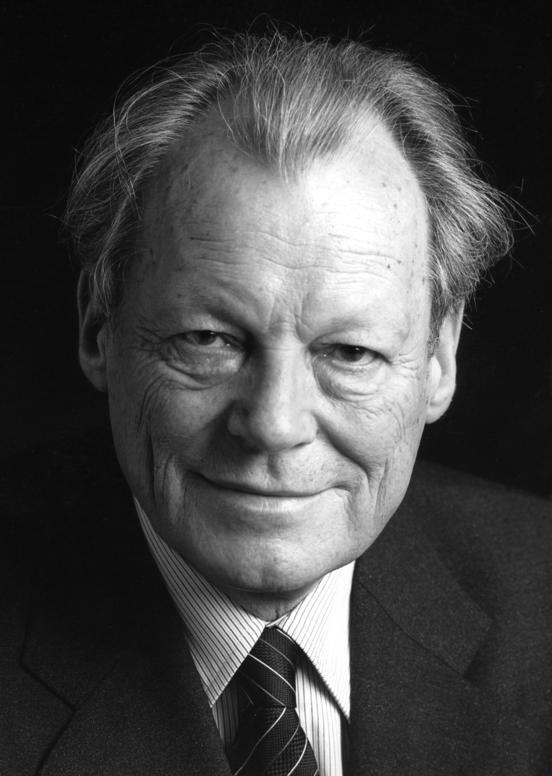
Willy Brandt
Willy Brandt was a prominent German politician and the Chancellor of West Germany from 1969 to 1974. He is best known for his efforts in promoting Ostpolitik, which aimed at improving relations with East Germany and the Eastern Bloc during the Cold War. Brandt's legacy includes significant social reforms and a Nobel Peace Prize awarded in 1971 for his work in fostering reconciliation in Europe. He founded the Monopolkommission nearly 50 years ago to address competition issues within the German economy.
Born on Dec 18, 1913 (112 years old)
Global Media Ratings
Countries Mentioned
| Country | Mentions | Sentiment | Dominance | + Persistence | x Population | = Reach | x GDP (millions) | = Power |
|---|---|---|---|---|---|---|---|---|
| Germany | 1 | 9.00 | 0.09% | +0% | 83,783,942 | 79,341 | $3,845,000 | 3,641$ |
| Switzerland | 1 | 5.00 | 0.09% | +0% | 8,654,622 | 8,014 | $700,000 | 648$ |
| Estonia | 1 | 8.00 | 0.09% | +0% | 1,326,539 | 1,260 | $31,000 | 29$ |
| Totals | 3 | 93,765,103 | 88,615 | $4,576,000 | 4,318$ |
Interactive World Map
Each country's color is based on "Mentions" from the table above.
Recent Mentions
 Estonia:
Willy Brandt was known for his policy of reconciliation and regret over Nazi crimes.
8
Estonia:
Willy Brandt was known for his policy of reconciliation and regret over Nazi crimes.
8
 Switzerland:
Willy Brandt is mentioned as a figure who was criticized by conservatives during his time.
5
Switzerland:
Willy Brandt is mentioned as a figure who was criticized by conservatives during his time.
5
 Germany:
Willy Brandt was the Chancellor of Germany who signed the Nuclear Non-Proliferation Treaty.
9
Germany:
Willy Brandt was the Chancellor of Germany who signed the Nuclear Non-Proliferation Treaty.
9
 Switzerland:
Willy Brandt was the Chancellor of Germany and a significant figure in Klaus von Dohnanyi's political career.
8
Switzerland:
Willy Brandt was the Chancellor of Germany and a significant figure in Klaus von Dohnanyi's political career.
8
 Italy:
Brandt's foreign policy is referenced as part of the historical context of Germany's dealings with Russia.
5
Italy:
Brandt's foreign policy is referenced as part of the historical context of Germany's dealings with Russia.
5
 Switzerland:
Willy Brandt, the SPD chancellor candidate, concluded his campaign events in the beer city at the Westfalenhalle.
8
Switzerland:
Willy Brandt, the SPD chancellor candidate, concluded his campaign events in the beer city at the Westfalenhalle.
8
 Switzerland:
Willy Brandt is referenced regarding Germany's past arms policies towards Israel during significant conflicts.
5
Switzerland:
Willy Brandt is referenced regarding Germany's past arms policies towards Israel during significant conflicts.
5
 Germany:
Willy Brandt is commemorated with a large bronze sculpture in the SPD party headquarters.
8
Germany:
Willy Brandt is commemorated with a large bronze sculpture in the SPD party headquarters.
8
 Belarus:
Willy Brandt was a prominent German politician who served as the Chancellor of West Germany and is known for his role in the 'New Eastern Policy'.
9
Belarus:
Willy Brandt was a prominent German politician who served as the Chancellor of West Germany and is known for his role in the 'New Eastern Policy'.
9
 Spain:
Willy Brandt was honored with the Nobel Peace Prize on October 20, 1971.
9
Spain:
Willy Brandt was honored with the Nobel Peace Prize on October 20, 1971.
9